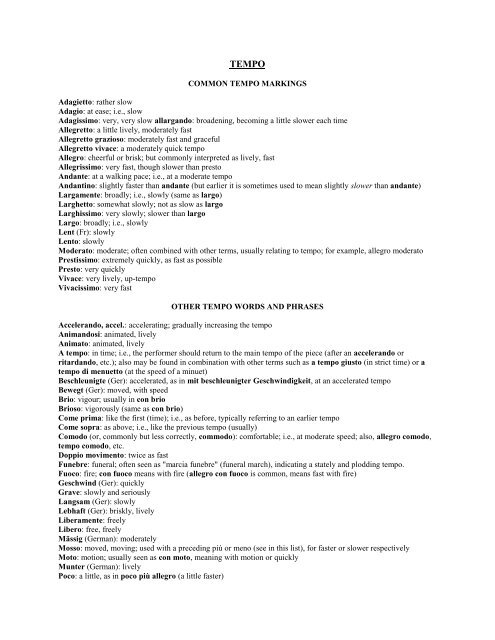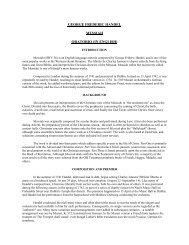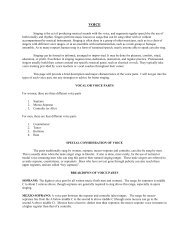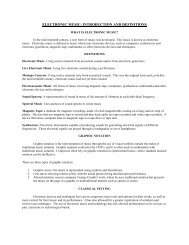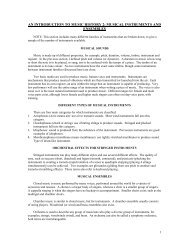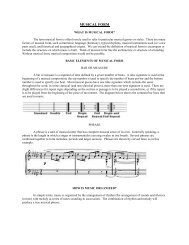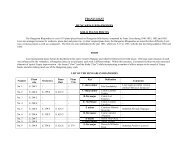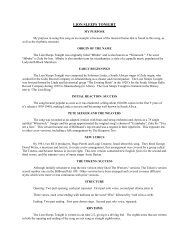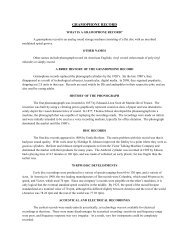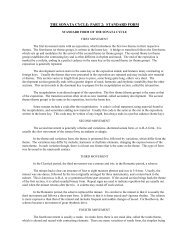COMMON TEMPO MARKINGS Adagietto: rather slow Adagio: at ...
COMMON TEMPO MARKINGS Adagietto: rather slow Adagio: at ...
COMMON TEMPO MARKINGS Adagietto: rather slow Adagio: at ...
You also want an ePaper? Increase the reach of your titles
YUMPU automatically turns print PDFs into web optimized ePapers that Google loves.
<strong>TEMPO</strong><br />
<strong>COMMON</strong> <strong>TEMPO</strong> <strong>MARKINGS</strong><br />
<strong>Adagietto</strong>: <strong>r<strong>at</strong>her</strong> <strong>slow</strong><br />
<strong>Adagio</strong>: <strong>at</strong> ease; i.e., <strong>slow</strong><br />
Adagissimo: very, very <strong>slow</strong> allargando: broadening, becoming a little <strong>slow</strong>er each time<br />
Allegretto: a little lively, moder<strong>at</strong>ely fast<br />
Allegretto grazioso: moder<strong>at</strong>ely fast and graceful<br />
Allegretto vivace: a moder<strong>at</strong>ely quick tempo<br />
Allegro: cheerful or brisk; but commonly interpreted as lively, fast<br />
Allegrissimo: very fast, though <strong>slow</strong>er than presto<br />
Andante: <strong>at</strong> a walking pace; i.e., <strong>at</strong> a moder<strong>at</strong>e tempo<br />
Andantino: slightly faster than andante (but earlier it is sometimes used to mean slightly <strong>slow</strong>er than andante)<br />
Largamente: broadly; i.e., <strong>slow</strong>ly (same as largo)<br />
Larghetto: somewh<strong>at</strong> <strong>slow</strong>ly; not as <strong>slow</strong> as largo<br />
Larghissimo: very <strong>slow</strong>ly; <strong>slow</strong>er than largo<br />
Largo: broadly; i.e., <strong>slow</strong>ly<br />
Lent (Fr): <strong>slow</strong>ly<br />
Lento: <strong>slow</strong>ly<br />
Moder<strong>at</strong>o: moder<strong>at</strong>e; often combined with other terms, usually rel<strong>at</strong>ing to tempo; for example, allegro moder<strong>at</strong>o<br />
Prestissimo: extremely quickly, as fast as possible<br />
Presto: very quickly<br />
Vivace: very lively, up-tempo<br />
Vivacissimo: very fast<br />
OTHER <strong>TEMPO</strong> WORDS AND PHRASES<br />
Accelerando, accel.: acceler<strong>at</strong>ing; gradually increasing the tempo<br />
Animandosi: anim<strong>at</strong>ed, lively<br />
Anim<strong>at</strong>o: anim<strong>at</strong>ed, lively<br />
A tempo: in time; i.e., the performer should return to the main tempo of the piece (after an accelerando or<br />
ritardando, etc.); also may be found in combin<strong>at</strong>ion with other terms such as a tempo giusto (in strict time) or a<br />
tempo di menuetto (<strong>at</strong> the speed of a minuet)<br />
Beschleunigte (Ger): acceler<strong>at</strong>ed, as in mit beschleunigter Geschwindigkeit, <strong>at</strong> an acceler<strong>at</strong>ed tempo<br />
Bewegt (Ger): moved, with speed<br />
Brio: vigour; usually in con brio<br />
Brioso: vigorously (same as con brio)<br />
Come prima: like the first (time); i.e., as before, typically referring to an earlier tempo<br />
Come sopra: as above; i.e., like the previous tempo (usually)<br />
Comodo (or, commonly but less correctly, commodo): comfortable; i.e., <strong>at</strong> moder<strong>at</strong>e speed; also, allegro comodo,<br />
tempo comodo, etc.<br />
Doppio movimento: twice as fast<br />
Funebre: funeral; often seen as "marcia funebre" (funeral march), indic<strong>at</strong>ing a st<strong>at</strong>ely and plodding tempo.<br />
Fuoco: fire; con fuoco means with fire (allegro con fuoco is common, means fast with fire)<br />
Geschwind (Ger): quickly<br />
Grave: <strong>slow</strong>ly and seriously<br />
Langsam (Ger): <strong>slow</strong>ly<br />
Lebhaft (Ger): briskly, lively<br />
Liberamente: freely<br />
Libero: free, freely<br />
Mässig (German): moder<strong>at</strong>ely<br />
Mosso: moved, moving; used with a preceding più or meno (see in this list), for faster or <strong>slow</strong>er respectively<br />
Moto: motion; usually seen as con moto, meaning with motion or quickly<br />
Munter (German): lively<br />
Poco: a little, as in poco più allegro (a little faster)
Rallentando or rall.: Broadening of the tempo (often not discernible from ritardando); progressively <strong>slow</strong>er<br />
Rit.: an abbrevi<strong>at</strong>ion for ritardando; also an abbrevi<strong>at</strong>ion for ritenuto<br />
Ritardando, ritard., rit.: <strong>slow</strong>ing down; deceler<strong>at</strong>ing; opposite of accelerando (see in this list)<br />
Rapido: fast<br />
Rasch (Ger): fast<br />
Rub<strong>at</strong>o: robbed; i.e., flexible in tempo, applied to notes within a musical phrase for expressive effect (tempo<br />
rub<strong>at</strong>o is common)<br />
Schnell (Ger): fast<br />
Schneller (Ger): faster<br />
Slargando or slentando: becoming broader or <strong>slow</strong>er (th<strong>at</strong> is, becoming more largo or more lento)<br />
Stretto: tight, narrow; i.e., faster or hastening ahead; also, a passage in a fugue in which the contrapuntal texture is<br />
denser, with close overlapping entries of the subject in different voices; by extension, similar closely imit<strong>at</strong>ive<br />
passages in other compositions<br />
Stringendo: tightening, narrowing; i.e., with a pressing forward or acceler<strong>at</strong>ion of the tempo (th<strong>at</strong> is, becoming<br />
stretto, see preceding entry)<br />
Tempo: time; i.e., the overall speed of a piece of music<br />
1. Tempo di marcia: march tempo<br />
2. Tempo di valse: waltz tempo<br />
3. Tempo giusto: in strict time<br />
4. Tempo primo, tempo uno, or tempo I (sometimes also written as tempo I°): resume the original<br />
speed<br />
5. Tempo rub<strong>at</strong>o, means "robbed time"; an expressive way of performing a rhythm; see "rub<strong>at</strong>o"<br />
Troppo: too much; usually seen as non troppo, meaning moder<strong>at</strong>ely or, when combined with other terms, not too<br />
much, such as allegro [ma] non troppo (fast but not too fast)<br />
Vif (Fr): Quickly, lively<br />
Vivo: lively<br />
Wolno (Polish): loose, <strong>slow</strong>ly


